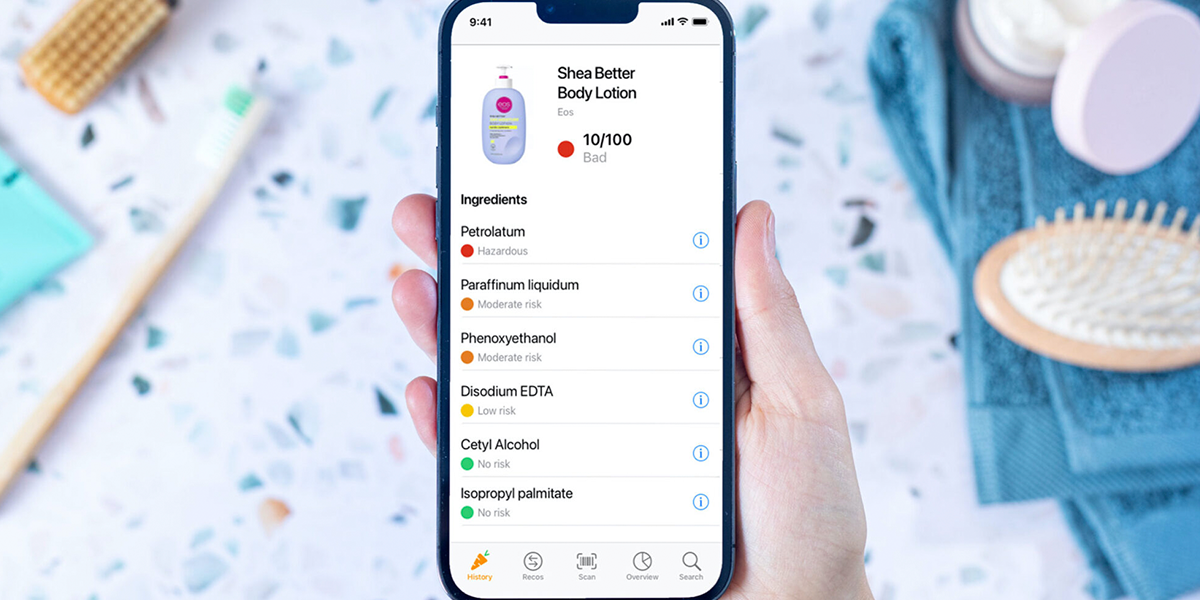
As Yuka Gains Millions Of Users, Beauty Industry Insiders Question The Veracity Of Its Product Ratings
With over 20 million users in the United States and 25,000 Americans signing up for Yuka daily, the food and cosmetics label analyzing app is drawing sharp criticism from some beauty industry insiders who argue it panics consumers about cosmetics ingredients they shouldn’t be scared of.
Launched in France in 2017 before traveling to the U.S. three years later, Yuka users scan cosmetics labels to reveal a product score from zero to 100. Products deemed excellent score 75 to 100, products deemed good score 50 to 75, and products deemed poor score below 50. Yuka employs colored dots to indicate the risk of a product: risk-free gets a green dot, low risk a yellow dot, moderate risk an orange dot and hazardous risk a red dot.
The scores are calculated based on Yuka’s evaluation of the risks of the ingredients in the products. For example, 10 points are given to potential carcinogens and seven points for allergens. Yuka has a database of 12,600 cosmetic ingredients it assesses for potential irritants, allergens, carcinogens, pollutants and endocrine disruptors, and it examines determinations from organizations such as the European Chemical Agency and U.S. Environmental Protection Agency, scientific research and international scientific databases.
Started by technology, digital, legal, financial and communications professionals Benoît Martin, François Martin and Julie Chapon, Yuka is in the top five health and fitness apps in the U.S. It covers 2 million beauty products. Better-rated recommendations are provided to users for products that score poorly. In November last year, Yuka introduced a feature allowing users to address the brands behind high-risk products by emailing or posting about them on social media platform X.
The app emphasizes it’s 100% independent and doesn’t take money from brands. Chapon told The Wall Street Journal it generates roughly $7 million in revenues, primarily from its premium users who pay $10 to $50 a year for benefits like customizable alerts for dietary preferences and restrictions and product search capabilities without scanning.
Yuka has increasingly concerned brands across beauty and food due to its growth to nearly 70 million users—it’s especially popular among gen Zers—and high-profile endorser in U.S. Secretary of Health and Human Services Robert F. Kennedy Jr., who said in late April that he and his wife use it.
But apps for scanning products aren’t new and have drawn the ire of brands for years. Similar to Yuka, Think Dirty and the Environmental Working Group’s Healthy Living app have been slammed for improper scientific understanding and misclassifying ingredients. Advocates for the tools contend brands with poor scores are merely trying to save their sales and reputations by renouncing them.
To highlight the range of opinions in the beauty industry on Yuka, for the latest edition of our ongoing series posing questions relevant to indie beauty, we asked nine brand founders, retailers, cosmetic chemists and product formulators the following: How do you see customers using Yuka, and what should they know about it? Is there anything you think the industry should do about apps like Yuka?
- Jeannie Jarnot Founder and CEO, Beauty Heroes
We’ve heard from many of our customers that they’ve used the Yuka app, and we applaud the growing interest in ingredient awareness. We love when people take a closer look at what they’re putting on and in their bodies. It’s always a step in the right direction.
At Beauty Heroes, our Ingredient Standard goes beyond excluding health-harming ingredients. We evaluate every product for its impact on both people and the planet, scrutinizing long-term safety, sourcing practices and environmental persistence. Our standard excludes silicones, petroleum-derived synthetics, acrylates, synthetic fragrance and other ingredients that don’t align with our commitment to ingredient integrity. Once our customers discover this level of curation, they often feel relieved to shop without needing to scan every label. They trust we’ve done the hard work for them.
Tools like Yuka can be helpful for raising awareness, but they can assess ingredients in isolation and sometimes miss the broader context of formulation. For instance, products may score poorly because they include ingredients like salicylic acid, titanium dioxide or peppermint oil, ingredients that are safe and effective when formulated with responsibly. This can lead to confusion or misplaced concern. That’s where deep, values-based curation becomes essential.
We see Yuka’s popularity as a signal. People want more transparency and accountability in beauty. The industry should listen. But it’s important to remember that ingredient safety is nuanced and can’t always be distilled into a single score. That’s where trust in truly rigorous, values-driven curation like what we provide at Beauty Heroes becomes invaluable.
- Romain Gaillard Founder and CEO, The Detox Market
Being French, I’ve known and followed Yuka for quite some time. My kids were scanning items at the supermarket with my mom when we were visiting Paris years ago. I’ve always loved the core idea: Giving consumers an easy way to get a quick health score and feel more informed about what they’re buying.
Sure, you can always criticize the methodology, oversimplifying complex ingredient safety or product nuances, but overall what it promotes is very positive: encouraging people to pause, scan and question. That’s a huge step forward in itself. It has been our mission for 15 years now.
At Detox, we’ve definitely had more people using Yuka recently, especially on the East Coast. Whether they agree with the specific scoring or not, the good thing is that it starts a conversation and that’s good for everyone.
That said, I believe there’s still a gap in how we educate customers, especially when it comes to sustainability. Transparency shouldn’t stop at health: carbon footprint, plastic use and end-of-life waste should be part of the conversation too. We started incorporating this kind of impact data on our website a few months ago, and I’d love to see the industry as a whole move in this direction. Apps like Yuka can play a big role in that evolution if they expand their scope and the industry supports them with better, more standardized data.
- Perry Romanowski Cosmetic Chemist and Co-Host, The Beauty Brains Podcast
Consumers using the Yuka app to scan their beauty products should understand one key thing: Yuka is not a regulatory authority and its rating system is not based on science. It’s a consumer-facing app that gives scores to products based on proprietary algorithms that weigh “ingredient safety,” often rooted in precautionary principles rather than balanced toxicological evaluations.
Apps like Yuka (and EWG Skin Deep) typically flag ingredients as "bad" based on the presence of substances listed on various watchlists, even if the ingredient in question is present in minuscule, legally permitted and non-hazardous amounts. That creates a misleading risk profile.
It can make a perfectly safe, well-formulated product seem dangerous and it often doesn’t consider the context of exposure or concentration, which is how real toxicology works. It also leads consumers to spend more money on products that are not actually safer.
Take phenoxyethanol, for example. Yuka might dock points for its presence even though it's widely used, has a solid safety profile at typical usage levels and is permitted by global regulatory agencies. So, you end up with a system where a basic moisturizing lotion scores higher than a sophisticated sunscreen with proven benefits just because of a red-flagged ingredient.
Yuka isn't evaluating efficacy. It's not telling you how safe the product is. It's also not telling you how well a product works. It is simply telling you whether a product has ingredients that pass its internal red/yellow/green flag system. The flag system is incomplete and can mislead you.
Scores can reflect ideology more than science. The app leans into clean beauty and precautionary frameworks, which tend to err on the side of fear, not function or balance. False reassurance can be just as harmful. Products rated "excellent" may not work for your skin type, deliver on claims or even be necessary in your routine. And, worse, in many cases ingredients rated as safe have not been thoroughly tested for safety. For example, preservatives that have replaced parabens and formaldehyde donors.
Rather than ignoring apps like Yuka, the industry needs to communicate better science in a consumer-friendly way. The safety information about ingredients is already published by the CIR (Cosmetic Ingredient Review) and the SCCS (Scientific Committee on Consumer Safety). This information was put together by actual toxicologists. Unfortunately, most consumers aren't reading peer-reviewed journals so the information is ignored. Maybe they could even make their own consumer-facing app.
Groups like the CIR and SCCS should also be communicating with consumers on social media. They should hire professional science communicators to do it. They can talk about: how safety is assessed (dose matters!), why regulatory bodies allow certain ingredients that have poor reputations and what tradeoffs exist when “free-from” marketing leads to worse-performing products.
But, ultimately, the real problem isn’t Yuka itself. There are a few problems that I'm not sure the industry can overcome. First, scary stories are just more interesting and attention grabbing. Consumers pay more attention when they are told something is dangerous versus when told something is safe.
Second, fear marketing works. Telling people to be afraid of their competitor's products is an effective way of getting someone to buy your product. So, a significant segment of the beauty industry benefits from the spread of misinformation like you get from the Yuka app.
There just isn't much money in making an app that tells you products are perfectly fine to use. Consumers need to have a villain and the Yuka app does a good job of pointing out which brands they think are bad and which ones they think are good. They don't really care whether what they say is true or not, although I'm sure they believe what they are selling. The best marketers always believe their own marketing.
- Cierra Sherwin Founder and CEO, First Production Beauty
The biggest issue with apps like Yuka is that they don't consider formula specifications. They look at ingredients as a whole and label as either good or bad, but don't consider the levels, percentages or delivery systems used. This can lead to fear mongering and misinformation because, as they say, "The dose makes the poison."
I am sure the intentions of the Yuka app are coming from a good place of education and empowering the consumer, but it would be a better source of information if they partnered with the brands and understood more of the exact specifications of the ingredients within their formulas before slapping a grade on the product.
- Galit Strugano-Wigdor Founder and Creative Director, Girlactik
As the founder of Girlactik, a brand that launched 25 years ago, I’ve seen the growing popularity of the Yuka app among the young generation. Its original focus on food has been great, but its expansion into cosmetics does raise concerns. I believe it's important for beauty shoppers to understand that beauty products require fundamentally different standards and approaches.
Yuka at times is misrepresenting clean beauty brands by assigning low scores to products from well-respected brands that are considered to have clean formulas. This can be both misleading and damaging. A major issue is the app’s tendency to generalize ingredients without considering how they’re formulated or regulated in cosmetics.
For example, the same ingredient can have vastly different safety implications depending on its form (e.g., powder versus solid) and its concentration in a formula. Yuka has overlooked this. Another discrepancy is when you have a well-known site/app like the EWG giving a completely different rating, where a brand is on the fair side in green and, on Yuka, it rates it as having a moderate risk, dropping the brand to a poor score.
As a product developer in creating Girlactik, it’s important that these rating platforms present accurate, well-informed data in specialized categories like beauty. They need take the time to properly research cosmetic ingredients and regulatory context before assigning ratings.
- AJ Addae Founder, Sula Labs
I don't blame customers for being curious about the impact of consumer products on their health. However, I liken Yuka's evaluations to the company's opinions rather than a factual, objective set of conclusions rigorously backed by multiple sources, which is typically the standard for reproducible science. Opinions are fine to have until they actively fuel misinformation that influences how consumers engage in and experience personal care science. That's where I generally tend to draw a line.
While I don't think the beauty industry can completely squash consumer distrust or hand-wavey science in every corner that it lives, the industry can certainly move towards strongly discouraging the facilitation of it and commercially disincentivizing it. That requires progress towards accepting a unified standard for scientific rigor in beauty, which is something I like to believe we’re gradually and meaningfully moving toward.
- Laura Lam-Phaure Founder, Lam Phaure Beauty
Although I know that Yuka is used by many, I think customers should not even open the app. It should just be deleted. The Yuka app does not include information that is accurate and does not take into account the nuances of formula development and testing that has been done on a product to ensure its safety. There is no greater understanding on concentration and intended use of the product, which is vital in assessing product safety. Yuka is fearmongering and causing customers to fear their products rather than try to understand them.
The beauty industry has been able to curate some fantastic science communicators to help customers understand the nuances of what is in their products. As this community of science communicators grow, it is my hope that it helps customers understand the complexity around formulas and help them make educated and informed decisions.
Products are not generically bad for everyone. Every person is different, and what is good and bad for one person may not be the same of another. The best example that I can provide is peanuts in food. Peanuts is a known allergen that can be fatal to some, but we do not go out of the way and shame peanut butter companies for selling products that can be fatal to a subset of people. Rather, we educate those who are allergic on how to avoid it.
- Josh Rosebrook Founder and CEO, Josh Rosebrook
The Yuka app, in my experience, does not fulfill its intended purpose regarding skincare. It aims to help users select products based on the quality of their ingredients, but it fails to effectively incorporate EU compliance, which is a major issue.
For instance, our products contain essential oils, and when a product is compliant, the allergens present in these oils must be listed separately. These allergens are found in many plants used in skincare and usually appear in trace amounts that don't typically cause sensitivity. However, Yuka treats these allergens as isolated additives, which unfairly lowers the ratings of products containing essential oils and listed allergens due to EU regulations. In contrast, brands that aren’t EU compliant simply list essential oils without disclosing any allergens, resulting in higher ratings on the app.
It's important to note that brands lacking EU compliance are not necessarily unsafe. EU regulations uphold the highest standards and should serve as the global benchmark for cosmetics. I reached out to Yuka to share this information and suggest improvements, but they completely ignored my feedback. Consequently, I find the app to be quite inadequate.
- Charlotte Palermino Co-Founder and Chief Brand Officer, Dieux Skin
It's a small overlap, but, before scanning your product, know that the results will not give you any relevant information about safety. It’s only useful if you have an allergy or intolerance. These apps cannot determine safety as they don't have percentages in the formula.
I wonder if there is a legal case to be made against these apps as they are spreading disinformation, but, in the interim, for now, all we can do is educate and empower people with truth.
If you have a question you'd like Beauty Independent to ask brand founders, retailers, cosmetic chemists and product formulators, send it to editor@beautyindependent.com.
This article was amended on May 22 to remove a sentence that said Yuka takes a percentage of sales from brands on its app. The company emphasizes it operates completely independent of brands and publishes its balance sheet on its website.
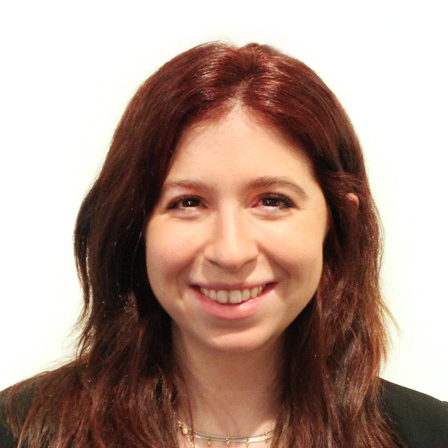

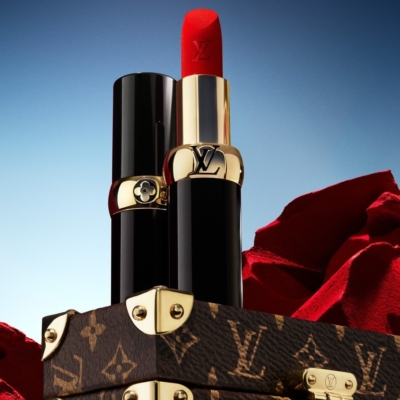
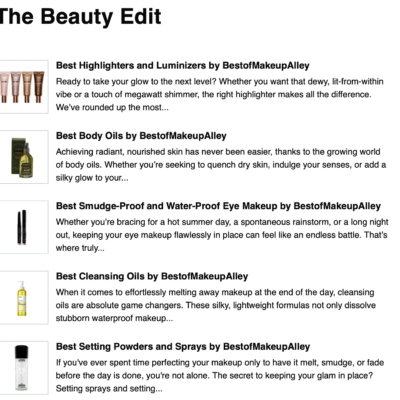
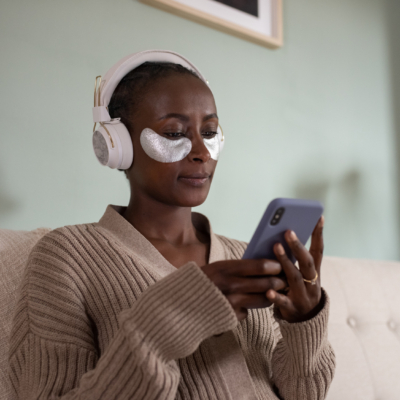
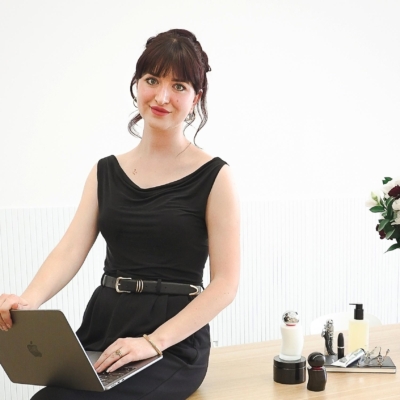
Leave a Reply
You must be logged in to post a comment.